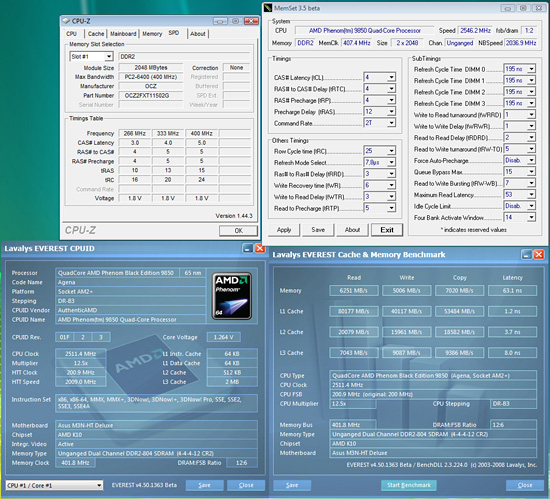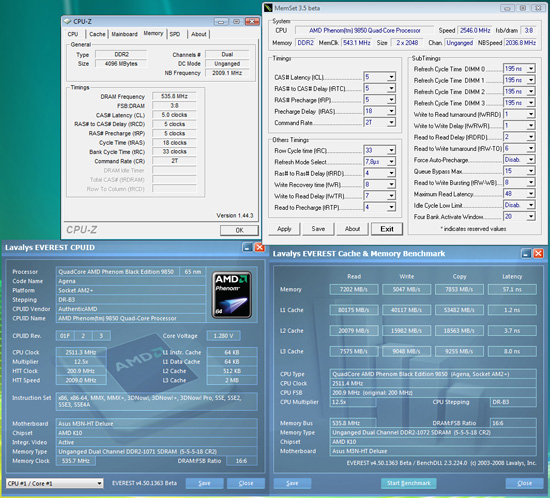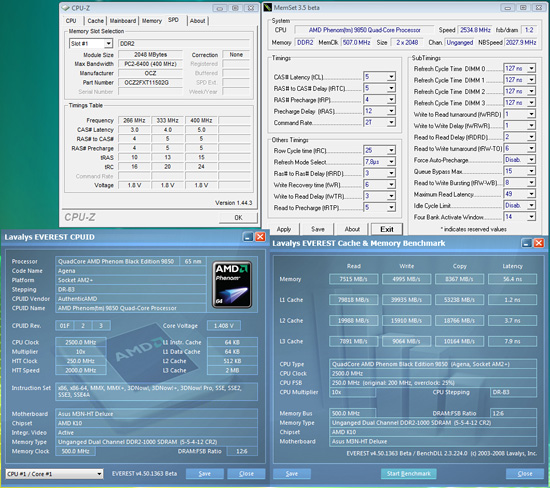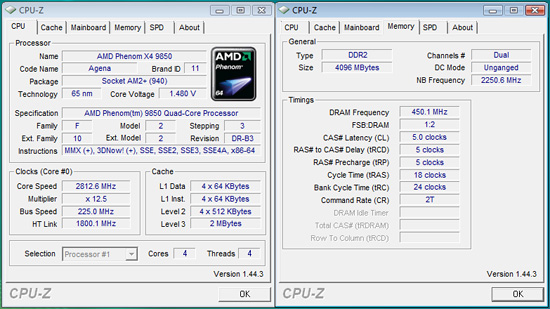NVIDIA 780a: Integrated Graphics and SLI in One
by Gary Key on May 6, 2008 12:00 AM EST- Posted in
- CPUs
Memory and Overclocking Performance
One of the most disappointing aspects of testing the ASUS M3N-HT Deluxe board was the general lack of compatibility with most of the 2GB modules at our disposal. The first few BIOS releases would rarely run a 2x2GB configuration in a stable manner and a 4x2GB setup was out of the question. The last BIOS release allowed us to complete our benchmarking sessions with a standard 4GB setup and 8GB was usable with one particular part from G.Skill. However, this board would lock immediately if you manually changed the settings for the onboard video memory from auto to a manual selection. The good news is that ASUS has replicated several of our problems and we expect a new BIOS release shortly for use in the motherboard review.
In the meantime, we are providing three test results with our memory at DDR2-800 and DDR2-1066 at stock processor settings along with a DDR2-1000 setting with an HTT overclock to 250 while retaining the same base CPU speed. DDR2-1066 operation was not always stable with 4GB or even 2GB for that matter, but we were able to complete our benchmark tests after relaxing several timings and increasing memory voltage from 2.0 to 2.1V. Overall, DDR2-1066 performance provided slightly improved latencies along with better read and copy throughput. Initial test results with several applications show a slight improvement of 1%~3% at stock CPU settings.
We wanted to show direct comparisons to the 790FX platform along with scaling and performance oriented timings, but the stability of the board with 4GB setups is just not to a point yet where we can guarantee 24/7 stability with performance oriented setups. We hope the BIOS updates from ASUS will address this quickly. Our initial testing with the MSI K9N2 Diamond board indicates this problem is strictly BIOS related as 4GB configurations are working well so far on this board.
Our most disappointing results with the board were during our overclocking tests. We constantly had to fight the 4GB memory problems and finally switched over to 2GB without much success either. This particular setup would only operate around 2.8GHz stable but required 1.48V and relaxed memory timings to reach this level.
Our particular CPU sample has done 3.3GHz at the same voltages on the 790FX platform. After discussions with NVIDIA and ASUS, the feel our current overclocking maladies are BIOS related at this time. We tend to believe them as manually setting the CPU voltage resulted in the board applying an additional 0.10V to the CPU. We noticed several other settings that would overvolt at various times but the CPU voltage was consistent and bothersome.
After a few days of trying to clock this board to meet the standards set by the 790FX platform, we decided to call it quits until the next BIOS release. One item worth mentioning is the BIOS design and options opened up by ASUS is nothing short of spectacular, especially in the memory timing section. We will go into more detail in the motherboard review, but if the memory, voltage, and OC problems are properly addressed, this should be one special board for Phenom overclockers.














38 Comments
View All Comments
homerdog - Tuesday, May 6, 2008 - link
Don't get me wrong, HybridPower is a cool feature that I will consider when I'm making my next motherboard/GPU purchase.However, the fact remains that the HD3K cards have a significantly larger delta between their idle and load power consumption figures than the current crop of Nvidia cards. If ATI continues to build on this trend they may not even need a complex mGPU/dGPU hybrid solution to get idle consumption down to near IGP levels, although they're probably working on one anyway.
JarredWalton - Tuesday, May 6, 2008 - link
Now we just need Hybrid Power in laptops - where it should have been first, IMO! At the very least, HybridPower should have shipped with support for 8800GT/GTS 512 and 9600 cards rather than just 9800 GTX/GX2.Also, my two cents on GeForce Boost: hooray for an extra 20% over 20FPS. That sounds fine, until you look at the bigger picture. A GeForce 8400 GS or 8500 GT is terribly slow relative to most discrete GPUs. Sure, they cost $40 to $70 depending on model and features. An extra 20% performance (or even 50%) would be fine. However, a $75 8600GT is already about twice as fast and a 9600GT (with rebates available for $110-$120) isn't even on the same continent.
If you have an IGP motherboard and you think it's too slow for games, I seriously doubt you're going to want to spend $50 to roughly double the performance. As any mathematician can tell you, multiplying any real number by zero is still zero. It may not be that bad, but I'd say 9600GT with Hybrid Power support is what people should shoot for. I figure that will arrive some time in the near future. Then just wait for it to show up on Intel platforms.
FITCamaro - Tuesday, May 6, 2008 - link
While I agree with you, I think this is a great idea. An onboard GPU is always going to use less power than a discrete one. The main issue I'm concerned with is, does the system get back the memory used by the onboard GPU when the discrete GPU is in use? Granted it's only going to use 64-128MB of RAM likely, maybe 256. But still, those are resources that aren't able to be used by games.Of course it doesn't really matter for most since it only supports the 9800GTX and 9800GX2 and, in my opinion, you'd have to be stupid to go with the 9800GTX when the 8800GTS 512MB offers nearly identical performance. Heck even the 8800GT 512MB is only about 5 FPS different.
They need to offer the hybrid power support across the entire 8x00 series.
BansheeX - Tuesday, May 6, 2008 - link
Who cares about the Phenom? Where is the Intel variant, aka 730i? Another three month delay for that one? Sigh.FITCamaro - Tuesday, May 6, 2008 - link
People who want a Phenom.DigitalFreak - Wednesday, May 7, 2008 - link
Those mythical people exist?KnightProdigy - Thursday, May 8, 2008 - link
There are a lot of AMD fans. AMD still has a lot of loyal followers, maybe you forget that AMD had the speed crown for many more years than Intel. I have been an NV fan since it was STB in the early 90s, I, for one, like the fact that they are offering similar solutions, even though they lag a little.Gary Key - Tuesday, May 6, 2008 - link
We expect to see the Intel mGPU variants this summer, just in time to compete with the G45.